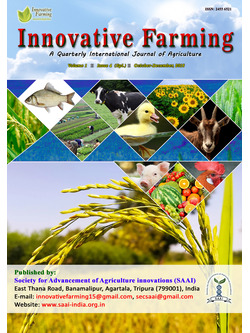
Smart Package and Practices for Direct Seeded Rice (DSR)
Suresh Kumar Kakraliya
CCS Haryana Agriculture University, Hisar, Haryana, India
L.K. Singh
International Maize and Wheat Improvement Center (CIMMYT), India
Arvind Kumar Yadav*
ICAR-Central Soil Salinity Research Institute, Karnal, India
H.S. Jat
International Maize and Wheat Improvement Center (CIMMYT), India
S.S. Kakraliya
SHIATS, Allahabad Agricultural Institute, Allahabad, UP, India
K.M. Choudhary
CCS Haryana Agriculture University, Hisar, Haryana, India
Ashim Datta
ICAR-Central Soil Salinity Research Institute, Karnal, India
DOI: NIL
Keywords: DSR, Nutrient, Transplanting, Planting
Abstract
Increasing scarcity of labour, water, and energy and rising cost of production, along with climate variability, are major challenges for the sustainability of rice-wheat system in the northwesten Indo-Gangetic Plains (IGP). Direct-seeded rice (DSR) with best management practices provided equivalent or higher yield and 30-50% lower irrigation water use than those of farmer-managed puddled transplanted rice (CT-TPR). DSR showed overall net benefit of up to 4000-5000 ha-1 as compared to puddled transplanted rice.
Downloads
not found
Reference
Gathala, M.K., Kumar, V., Sharma, P.C., Saharawat, Y.S., Jat, H.S., Singh, M., Kumar, A., Jat, M.L., Humphreys, E., Sharma, D.K., Sharma, S., Ladha, J.K., 2013. Optimizing intensive cereal-based cropping systems addressing current and future drivers of agricultural change in the northwestern Indo-Gangetic Plains of India. Agriculture Ecosystem and Environment, 177, 85-97.
Humphreys, E., Kukal, S.S., Christen, E.W., Hira, G.S., Balwinder-Singh, Yadav, S., Sharma, R.K., 2010. Halting the groundwater decline in North-West India - which crop technologies will be winners? Advances of Agronomy, 109, 155-217.
